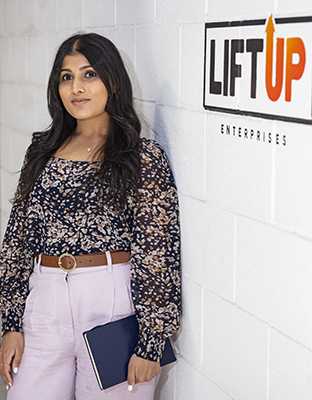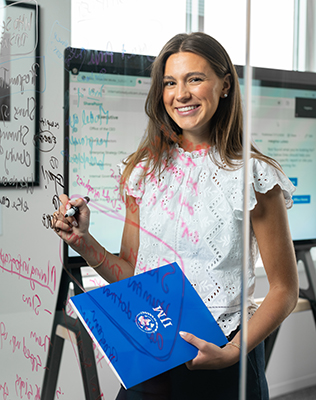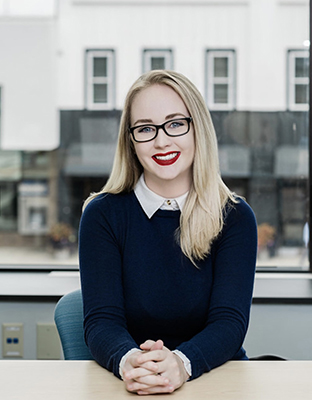2024 Interns Making a Difference in the USA
About our Internships
This year, Business+Impact is supporting 21 students through its Summer Fund, and 36 U-M students overall in a variety of summer internship experiences. Each summer, Business+Impact awards competitive grants for summer internships to MBAs and BBAs in the Ross School of Business as well as MPP students in the Ford School of Public Policy.
MBA funding comes from the Give-A-Day Fund, a student-led MBA pay-it-forward fund, and from the Gordon Impact Entrepreneurship Fund, which provides support for BBA or MBA student internships with ventures or funders seeking to create societal impact. Additionally, B+I’s Detroit Neighborhood Entrepreneurs Project (DNEP) hosts several undergraduate students in its Impact Studio for Local Business (ISLB). This year, DNEP ISLB is hosting 12 students.
Click here to see a Flickr album of photos from our 2024 interns.
BELOW, WE SHARE FOUR SNAPSHOTS OF SOME IMPACT INTERNSHIP EXPERIENCES, PROVIDING A WINDOW INTO THE BROAD EXPERIENCES THAT BUSINESS+IMPACT OFFERS:

Shailee Ghelani (MBA ’25)
LiftUp Enterprises – Chicago, IL
Describe the project you worked on for your internship.
LiftUp Enterprises (LUE) is a for-profit social enterprise that aims to bridge the systemic wealth gap and support low-wage workers in a sustainable and scalable way. LUE brings a dignity-based operating model and wrap-around services to the low-wage job industry to accelerate the stability, mobility and personal growth of its employees. My work with LUE focused upon two key initiatives:
First, I created an external-facing slide deck that outlines LUE’s fundraising journey and capital stack. Given LUE’s unique model, it has had to be innovative in its fundraising efforts, resulting in funds raised via seven different mechanisms that span grant, patient, and commercial capital. LUE believes that effective capital flows are critical to social enterprises that are disruptive to our current systems and strive to make capitalism work for underserved communities. The slide deck has been circulated to several individuals who hold high-level positions within philanthropy and impact investing. At the very least, it is serving as an educational resource for these key players to help their organizations understand that there are several mechanisms to support social enterprises like LUE. In some cases, it is serving as an entry point for LUE to raise additional funds. After five years of testing and improving its model, LUE is motivated to scale and enable sustained impact in the greater Chicago area. Currently, LUE operates one holding company that provides landscaping, cleaning, and graphics wrapping services.
The second initiative I worked on was to identify and analyze potential industries LUE could expand into, including an analysis of expanding its current business lines. Upon identifying target industries, I have worked on articulating our plan for expansion in an updated investor deck, which will continue to be used to raise funds in the coming months.
How did your work specifically help deliver social impact through this experience?
Through its dignity-driven model, LUE provides employment and wrap-around services to LatinX workers in the Chicago area. The LatinX population in Illinois faces a poverty rate of 15% (compared with an overall average of 12%). LUE leverages dignity-based operating principles to create livable jobs that offer benefits that are relevant for low-wage workers, consistent and flexible scheduling, opportunities for advancement, and a fair and engaging workplace, ultimately supporting employees in reducing their cognitive load and creating pathways toward stability.
My work on the industry analysis and related updates to the investor deck will enable LUE to effectively raise funds for expansion. Funding expansion will not only enable LUE to expand into higher margin business lines (further stabilizing the business), but it will also enable LUE to hire more employees for which they provide dignity-based employment and wrap-around services.
More broadly, the capital stack document will hopefully influence some philanthropic and impact investing actors to consider new approaches to supporting social enterprise.
How do you predict that this internship will affect your career path?
I aim to be an impact investor focused on community development, and as someone without prior business experience, gaining hands-on strategy and operating experience with a social enterprise has been a pivotal step in my journey. My time with LUE has allowed me to understand what it takes for an innovative social enterprise to raise funds and consider expansion. Experiencing this from the perspective of the company has been eye-opening, and I know it will serve me well in being a strong yet empathetic investor one day. I was also able to dig deep and build expertise on how funders can be innovative in supporting social enterprises, which is a question I hope to keep pushing the dial on throughout my career.
Further, working closely with LUE’s Founder and President, Julian Posada, has been an honor and an incredible learning experience in itself, especially given how he is harnessing his incredible background in business and nonprofits to now disrupt our current systems to make capitalism work for underserved populations. He was also introduced me to individuals in LUE’s network who are working in impact investing, which has helped me determine what types of roles I’m most interested in pursuing for full-time opportunities.
How did the funding you received through B+I improve your internship experience?
The support from B+I was integral to me having a positive internship experience. It enabled me to fully focus on producing strong work for LUE. Further, the funding enabled me to travel to Chicago for a week, which was the highlight of my internship experience. During the trip, I was able to work with the team in person, present my work to current and potential funders, and meet incredible individuals within LUE’s network.
What advice do you have for future interns?
My advice is to have clarity about your goals and the skills/experience you want to gain during your internship and articulate that to the organization you are working with. However, it is also important and rewarding to stay nimble and think about how your existing skills can serve the organization’s needs at the time of your internship.
 Paighton Gimotty (BBA ’26)
Paighton Gimotty (BBA ’26)
International Justice Mission – Arlington, VA
Describe the project you worked on for your internship.
I worked to develop educational onboarding materials to aid in change management and teach about a recent restructuring that affected the entire 1400+ person organization. Additionally, I aided in running the annual Global Leadership Retreat which provided space and working sessions to address the most poignant issues faced by global functions and the 44 offices in which IJM operates.
How did your work specifically help deliver social impact through this experience?
The D.C office is responsible for the infrastructure that has allowed IJM to expand into its 30 current jurisdictions and work toward its goal to protect 500 million in poverty from violent acts of injustice. They partner with local governments to strengthen justice systems in order to protect the individuals historically harmed through violence against women and children, police abuse of power, land theft, and human trafficking for both labor and sex. We work to provide value both for survivors and victims in the field, as well as donors and government stakeholders. I was able to streamline some of the backend processes that enable this critical fieldwork.
How do you predict that this internship will affect your career path?
This internship confirmed my hypothesis that there is a huge need for business acumen in the NGO and nonprofit space and that the business world can and should play a critical role in social justice. I learned so much about organizational structure and 501c3 management, governance, and strategy, fueling my desire to pursue nonprofit management as my concentration. Our generation is uniquely attuned to injustice, and the knowledge that the private sector has an increasing and critical role in addressing issues like human trafficking and online sexual abuse of children specifically. I hope to continue to pursue the business toolkit that allows for scalable change and paves the way for deep and necessary investments from the corporate world in addressing these hard and uncomfortable topics.
How did the funding you received through B+I improve your internship experience?
This funding enabled my 13-week in-person internship in every way. Being in-person allowed me to attend the C-suite offsite and form meaningful relationships with leadership throughout the organization. It aided my learning and investigation in the NGO world, and beyond that, gave me the experience of living in the nation’s capital during an election year, which was a stimulating and unique experience.
What advice do you have for future interns?
I would venture to say that most people love the infusion of energy and passion that comes with an intern class, perhaps particularly in “impact” spaces. Interns remind staff why they love the mission and vision. We remind them why they started, and that there is a whole generation of future leaders ready to learn and do as much as they can to move the mission forward.
In terms of advice, I would encourage interns to be someone that leadership is eager to invest in and to get to know your intern class. Introduce yourself to as many people as possible, especially colleagues in divisions different than your own. Always express your enthusiasm and encourage the people you meet that their work has impacted you, following up with them when possible.
What are you most proud of from your summer?
I am proud of the ways I pursued my own learning and investigation this summer. The one things you can be sure of taking away from an internship are connections, relationships, and the results of your own inquisitive learning. Answers to my most burning questions about multinational organization operations and strategy shape how I approach my career going forward, and I am proud of the time I put into getting to know the people whose work I’ve admired for years.

Jaymie Tibbits (MPP/MSW ’24)
Michigan Coalition Against Homelessness – Lansing, MI
Describe the project you worked on for your internship.
I worked on a few main projects over the summer during my internship. There was a high-profile Supreme Court Ruling on the case Johnson vs. Grants Pass, OR that was decided at the end of June, which has negative implications for individuals experiencing homelessness. As an advocacy organization, Michigan Coalition Against Homelessness (MCAH) is essential to helping communicate with the public how inaccurate, and dangerous policies like the “camping ban” in Grants Pass, OR actually are. As part of my role, I helped to draft an official op-ed on behalf of the organization, in response to the ruling.
Relatedly, I contributed to an informational toolkit concerning the “criminalization of homelessness”. As part of this work, I researched the history of the type of legislation that was upheld by the Supreme Court and similar punitive policy responses to issues such as immigration.
One of my other favorite projects was creating videos from the testimony of individuals with the lived experience of homelessness, who bravely shared their stories with the Michigan Senate Civil Rights, Judiciary, and Public Safety Committee in support of proposed legislation.
How did your work specifically help deliver social impact through this experience?
There is grave misinformation about the causes of homelessness and those individuals who find themselves without shelter. As we’ve seen in certain localities, some of these stigmatizing and inaccurate narratives have been driving policy decisions. A main goal of my work with MCAH this summer was producing materials to combat the falsehoods that are projected onto the homeless community and then promote legislation built on evidence-based solutions.
How do you predict that this internship will affect your career path?
I was drawn to this internship because of my previous work and interest in housing policy but the opportunity helped confirm that this is one of the issues that is most important to me. I could definitely see myself working in this policy area after graduation.
How did the funding you received through B+I improve your internship experience?
I don’t think I would have been able to intern with MCAH if it wasn’t for this generous funding.
What advice do you have for future interns?
I would encourage future interns to use this experience to seek out an opportunity that aligns with their values. I believe you will have a completely different experience if you’re working on issues you care about, and oftentimes those are the organizations that could use your support the most.
What was one of the highlights of your internship experience?
I attended the 2024 Civil Rights Summit on Fair Housing with some team members from MCAH. There were so many incredible and impactful speakers, sharing a diverse array of housing-related policy issues. This event was really energizing for me and I learned about some new areas of research that helped inform my advocacy with MCAH.
Rebecca Trychel (MPP ’25)
MiLEAP – Lansing, MI
Describe the project you worked on for your internship.My internship was with the Early Education Office at MiLEAP (Michigan Department of Lifelong Education, Advancement, and Potential). MiLEAP focuses on educational areas outside K-12, such as pre-K programs, childcare services, afterschool programming, and higher education. Very few states have a dedicated department for areas like early childhood education, making this a particularly unique and valuable experience given my interests. As a mother to young children and currently halfway through my pregnancy, I understand the critical importance of accessible pre-K and childcare resources for working parents. I know how hard being a working parent can be, so my personal experiences have both informed and underscored the significance of my work. During my internship, I participated in various projects, but I believe the most impactful was working on the grant writing and research team for Michigan’s Preschool Development Grant Birth Through Five (PDG B-5) application. I’m very honored to have been trusted to work with the team on something so impactful and significant for the working families of Michigan.
How did your work specifically help deliver social impact through this experience?
I’m very interested in policy and research projects that contribute to fighting gender inequality. The majority of the time, mothers and those in maternal roles take on the primary responsibility for childcare. Quality pre-kindergarten and accessible childcare programs are essential to ensuring that mothers have the same opportunities as their male counterparts, preventing career interruptions and negative impacts on their lifelong earning potential. Both childcare and pre-K programs are also heavily staffed by female employees, so ensuring these programs are well-supported and funded helps fight gender inequality in the workforce.The PDG B-5 is competitive federal funding aimed at improving existing and creating new birth-through-five programs and services. If our state is selected — and I feel confident we will be — this will bring in $8-$10 million annually for the next three years. This funding will support existing programs and make them more accessible and equitable, directly benefiting children and families, especially those from underserved communities. It will also ensure that women employed in these programs have more stable and supported careers.
How do you predict that this internship will affect your career path?
In the long term, my goal is to stay in Michigan and focus on local and state policy. This internship provided a wonderful opportunity to connect with the team at MiLEAP and collaborate with other departments, such as the Michigan Department of Health and Human Services and the Michigan Department of Education. Additionally, I gained insights into the advocacy and research organizations partnering with MiLEAP to develop projects. These connections and experiences have strengthened my network and deepened my understanding of state-level policy, which will be invaluable as I pursue a career in public policy within Michigan.
How did the funding you received through B+I improve your internship experience?
This was an unpaid internship. MiLEAP is a brand-new department (less than 6 months old at the start of my internship), and I secured the position by directly reaching out to them, as there was no advertised job posting. Without the funding from B+I, I wouldn’t have been able to take advantage of this unique opportunity. I have a family to support, so despite my initiative, I would have had to turn down this internship in favor of a paid position, which likely wouldn’t have been as fulfilling or aligned with my career goals. The B+I funding allowed me to engage deeply with early childhood education development programming in Michigan and learn more about the ongoing efforts to support our state’s families and youngest residents.
What advice do you have for future interns?
Don’t be afraid to suggest projects or offer ways you can help. Direction may not always come immediately. At the beginning of my internship, before bigger projects began, I actively sought out ways to be useful. I read my emails, talked with staff in the office, and looked for opportunities to pitch in. I would email my supervisor with suggestions like, “Hey, if I did this, would it help with such-and-such project?” This proactive approach, demonstrating my abilities as a researcher and writer, led to my involvement with the PDG grant writing team. Being a self-starter and actively looking for ways to contribute can make a significant difference.


